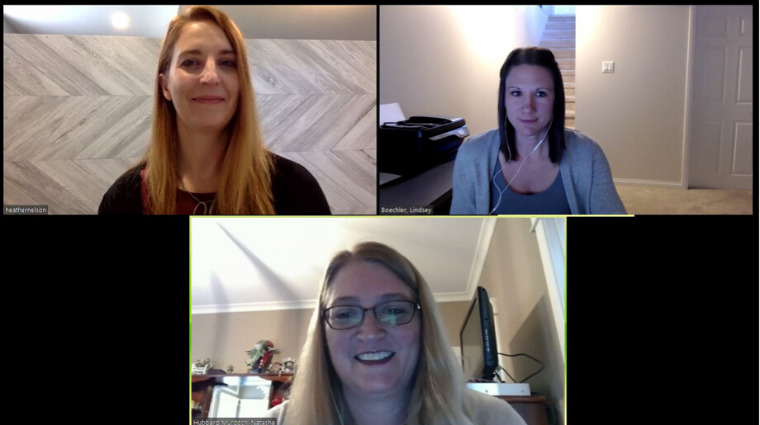
Researchers at the Centre for Health Research, Improvement and Scholarship in the Schools of Health Sciences and Nursing at Saskatchewan Polytechnic have come together to collaborate on research projects related to the COVID-19 pandemic.
Researchers Lindsey Boechler, Natasha Hubbard Murdoch and Heather Nelson have developed a number of studies focused around the experiences of key groups during the pandemic including police officers, paramedics, nurses and senior citizens. The research will allow for the examination of the experience of seniors in extended social isolation and capture real time experiences of frontline workers.
The impact of COVID-19 on first responders and nurses
As a former advanced care paramedic with educational leadership experience, adapting a COVID-19 research project to capture the real time experience of paramedics and police officers was a natural fit for Lindsey Boechler, research chair, cultural empowerment. “A better understanding of what paramedics and police are experiencing during such an unprecedented and challenging time will help identify resources needed to better support frontline personnel,” says Boechler. In addition to her COVID-19 research, Boechler is also investigating equitable access to health services for Indigenous youth and newcomers to Canada.
Early on this Sask Polytech research team adopted a collaborative approach by supporting each other’s projects and working together.
Boechler’s research on the experience of paramedics and police officers came about from an adaptation of Nelson and Hubbard Murdoch’s research on the experience of nurses during the COVID-19 pandemic. By working closely to plan projects, sharing resources and providing insights, the initial study on nurses was able to transform to meet the needs of two other professions and has helped other projects get rolling.
Researchers have taken on these COVID-19 projects in addition to their day-to-day work and other research. Hubbard Murdoch, research chair, interprofessional care, has researched interprofessional education, mentorship and social media professionalism, with a current focus on informal caregivers.
As it relates to her fields of work, the study of the experience of COVID-19 has piqued her interest, “it is interesting to me to see how the pandemic has, at this point, created discussion around mentorship, leadership, quality of care and has implications for interprofessional learning and working,” says Hubbard Murdoch.
The impact of COVID-19 on seniors and other vulnerable populations
Nelson is also working on another study with lead researcher, Bev Ziefflie and a team of faculty from Sask Polytech including Rhonda Unique and Paula Mayer, to examine the experiences of a vulnerable population, seniors self-isolated during the COVID-19 pandemic. It will focus on the social and emotional challenges of self-isolating for an extended period of time and the data gathering will act as a method of socializing for the participants. “Hopefully this research can look at needed supports for seniors who are socially isolated,” says Nelson, a registered nurse and research chair, vulnerable populations. Nelson has done research with vulnerable populations such as Indigenous students, international students and is currently working on a project with low-income youth, in addition to her COVID-19 research.
The projects have received a lot of support and interest from participants who are receptive and eager to share their experiences; over 200 interviews and surveys have been completed in just under two months. Boechler, Hubbard Murdoch and Nelson are using qualitative research methods including surveys and interviews to gather data. The data collection is ongoing and will continue throughout the pandemic (upwards of a year). In some cases data collection will document individual experiences at multiple points over the course of the study to see how things have evolved.
The collaborations and proactive work done by these researchers as the pandemic unfolds will shed light on the impact COVID-19 is having on those directly affected. By capturing real time experiences of frontline workers and documenting the challenges seniors face, the impact of COVID-19 can be used in the future to create improved preparedness strategies, supports and training. These studies “will serve as a historical time capsule of a very challenging time. We are hoping that the information gathered today can be used to help plan for future pandemics and outbreak situations,” notes Nelson.
This first stage of knowledge sharing from the researchers at the Centre for Health Research, Improvement and Scholarship will take place over the next six months through social media and newsletters. After data collection is complete, which could take up to a year, the researchers will publish their findings on the impact of COVID-19 on first responders, nurses and vulnerable populations.
Published May 2020.

